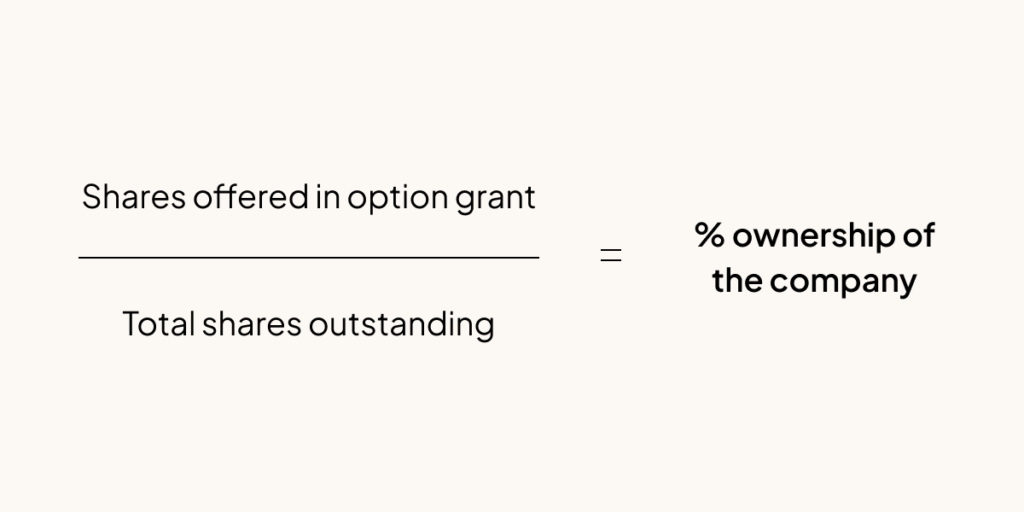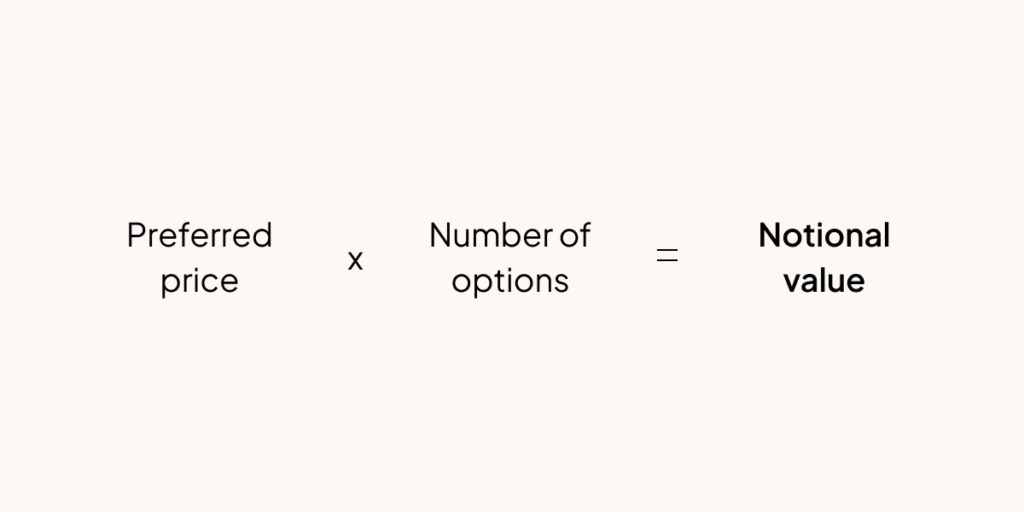Getting a job offer can be both exciting and stressful. Understanding your base salary is easy enough, but once you factor in bonuses, PTO, health insurance, and other perks, it’s hard to make sense of it all.
And if the company offers equity (as they should), it further complicates things—companies don’t always give you all the information you need to calculate how much your shares could be worth.
Before signing on the dotted line, make sure you understand the basics of equity (like what vesting, cliffs, and strike price mean) so you can evaluate your equity offer. You should also ask a few standard questions to make sure you are getting a fair equity grant that represents your potential contribution to the company. Finally, after you have the information you need, do some basic calculations to understand how much your startup equity could potentially be worth if the company succeeds (don’t worry, we have a startup equity calculator for that).
How to value startup equity
Before taking the job, make sure you ask these three important equity questions:
1. What percentage of the company’s equity am I getting?
The raw number of options the company is offering you doesn’t mean much since companies have different amounts of shares. The best way to compare offers is to look at the percent of ownership you’re being granted.
Make sure the company includes all outstanding shares (including preferred stock, restricted stock, etc.) when calculating this percentage—not just what’s left in the option pool. Otherwise, your actual percentage could be smaller than what they say, and you might not be comparing offers apples to apples if two different methodologies are used.
Alternatively:
-
Ask how many fully diluted outstanding shares there are and do the math to determine your percent ownership:

-
Or, determine the projected notional value of your option grant:

2. How do you decide how many options each employee gets?
Make sure the company has an established method for figuring out how many options to offer instead of coming up with a number willy-nilly. Bonus points if they continually reevaluate their process to make sure it’s fair. The later stage the company, the more built out the system should be. Ideally, the company maps each role to a level and a corresponding equity and salary band.
No system? Then your offer might not be very fair. You’ll want to do more due diligence with the first question.
3. Do you offer employee liquidity and/or refresh grants?
In other words, will you be able to sell shares before an exit (like an IPO)? If the company intends to remain private for a while, ask if they will hold tender offers (opportunities for shareholders to sell shares of equity). Note: approach this topic delicately. You don’t want to come across as money-hungry, but it’s fair to want to know whether your shares will actually amount to anything.
If the company is unwilling to budge on your equity offer and you feel it is too low, ask whether they offer equity refresh grants after a certain amount of time or in certain situations, like if you get a promotion. A refresh grant gives you a separate set of options that vest over a new period of time.
Download our startup equity calculator
Once you have all the necessary numbers, it’s much easier to compare multiple offers (or compare your new job offer to your current equity package). Our free startup equity calculator can help you understand the potential financial outcome of your offer.
Download the free calculatorTo use this calculator, you’ll need the following information:
-
Last preferred price (the last price per share for preferred stock)
-
Post-money valuation (the company’s valuation after the last round of funding)
-
Hypothetical exit value(the value the company could exit at)
-
Number of options in your grant (the total number of options offered to you)
-
Strike price (the price per share to exercise your options)
You should be able to find most of this information in your offer letter, but if you don’t, don’t be afraid to ask the company.
How to negotiate equity in a startup
Even if you’re satisfied with the company’s equity offer, it doesn’t hurt to ask for more. A study done by Linda Babcock found that on average, people who negotiated were able to increase their salary by over 7%. That’s money or options you wouldn’t have otherwise—all for asking a simple question.
Negotiating can be intimidating, but it’s easier if you go into the conversation prepared. Here are some dos and don’ts to keep in mind:
-
Never say a number first. You’re not obligated to tell the company how much you’re currently making or the salary you’re looking for. In fact, in some states, it’s illegal for them to ask how much you make. Instead, ask them what their range for the position is, and you can decide whether that seems fair.
-
Do your research. Negotiating is easier if you can justify why you deserve more. Beginning the conversation with “I have another offer with a notional value of $X” or “people at my level usually receive Y% of the company” is much more convincing than “I deserve more.” Before you ask, research what other people are making, comparables for other companies, and any other relevant data points. Glassdoor, Payscale, and GetRaised are good places to start on the salary front, and you can sometimes see the equity percentages companies offer on AngelList.
-
Know what parts of the equity grant are negotiable. Unless you’re an executive, you’ll likely only be able to negotiate your number of shares. It doesn’t hurt to ask about vesting schedules, acceleration triggers, and different types of stock—just know those parts of your offer may not change.
-
See if you can negotiate other aspects of your offer. If the company is unwilling to budge on the equity aspect (e.g. if they don’t want to dilute their option pool or view the level of the role differently), see if they can raise your compensation via other means, like a sign-on bonus or higher salary.
-
Know what you care about most. Some people choose to ask for more salary, while others ask for more equity—or both. Understand your risk tolerance, need for money in the short-term, and the potential of the company when considering where you want to negotiate.
Other questions to ask about your equity offer
While the three questions we covered earlier can help you understand the basics of your offer, the answers to these questions below will help you dig into the details:
-
What was your company’s valuation after your last round of funding? The company’s post-money valuation shows how investors valued their shares of the company. If you multiply the company’s valuation by the percent you stand to own, you can get a general idea of how valuable your grant is right now. If the company isn’t willing to share this, try checking a site like Crunchbase or Pitchbook, or see if their latest valuation was announced in a recent press article.
-
When do my shares vest? You usually have to earn your shares (or the right to purchase shares) over time. This process is called vesting. Make sure you know how long you have to stay at the company in order to earn your options or shares. And if the company is offering RSUs, make sure you understand whether there’s a condition tied to them (e.g. you won’t receive them until the company goes public).
-
Tip: Ask if your vesting schedule is the same as what others get in the company. Today, it’s pretty standard to see a four year vesting window with a one year cliff and monthly vesting after that. If the schedule is different, ask why.
-
Tip: Ask if your vesting schedule is the same as what others get in the company. Today, it’s pretty standard to see a four year vesting window with a one year cliff and monthly vesting after that. If the schedule is different, ask why.
-
-
How long after leaving the company do I get to exercise my shares? What is your post-termination exercise (PTE) policy? When you leave a company, you may only have a certain amount of time to purchase your options before the company puts them back into the option pool. If you don’t buy them in that time period, you’ll lose them. For some companies, you may only have 90 days. It’s important to know this so you can ensure you have enough money to exercise your stock options (if you choose to) and pay taxes.
-
If/when the company goes public or gets acquired, what’s the minimum valuation it needs for people with common stock to make a profit? Usually, investors get a guaranteed return while employees only stand to make a profit if the company is worth above a certain amount. Find out what that amount that is.



